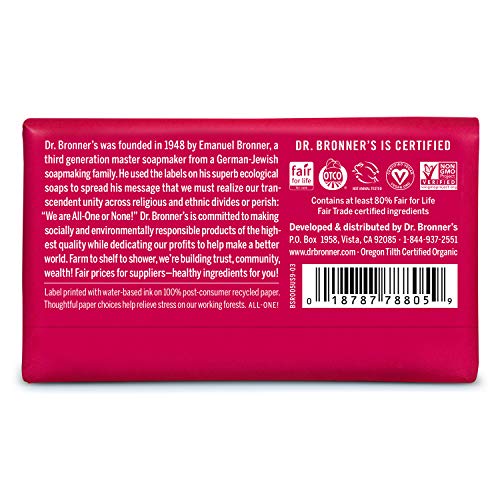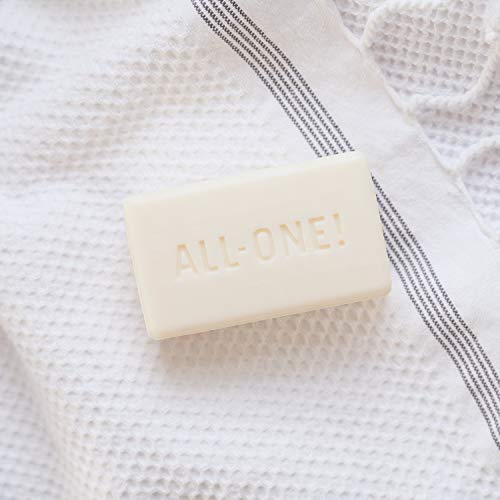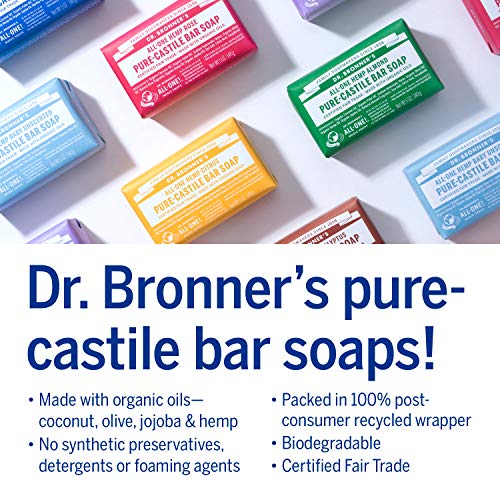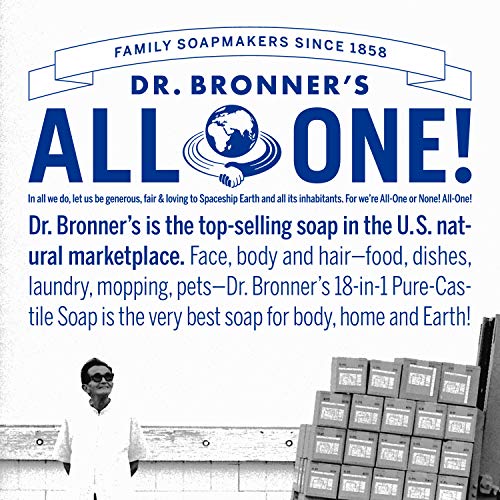





Dr. Bronner's Pure-Castile Bar Soap - Moisturizing, Organic Ingredients, Vegan - 5oz, 6-Pack


Fragrance
High RiskFragrance refers to a mixture of aromatic compounds used in products to provide scent. It is commonly listed as 'fragrance' or 'parfum' on product labels and can serve various functions, including enhancing user experience and masking undesirable odors.
Sustai Insights
Fragrance offers functional benefits by improving product appeal; however, it poses significant health risks, notably a high likelihood of causing allergies and allergic contact dermatitis. Environmental risks include potential pollution and endocrine disruption, though its overall carcinogenicity is low. Regulatory bodies have noted concerns regarding its use, leading to a high-risk classification. Safe usage practices should be observed, and alternatives such as natural essential oils are recommended for those sensitive to synthetic fragrances.
Sodium Hydroxide
High RiskSodium hydroxide is a highly caustic and reactive inorganic compound commonly used as a pH adjuster in various products. It is effective in neutralizing acids and plays a role in the production of soaps and detergents.
Sustai Insights
Sodium hydroxide serves essential functions, particularly in adjusting pH levels, but poses significant health risks, including skin and eye irritation. It is subject to high usage restrictions due to its corrosive nature. Environmental concerns include its potential to pollute water sources and contribute to ecosystem damage. Regulatory bodies have imposed strict guidelines on its use, indicating a high-risk profile for products containing this ingredient. Safe handling practices are crucial, and alternatives include milder pH adjusters, emphasizing the need for caution in its application.
Cannabis Sativa (Hemp) Seed Oil
Medium RiskCannabis sativa (hemp) seed oil is extracted from the seeds of the hemp plant. It is rich in essential fatty acids and is commonly used in cosmetic and health products for its moisturizing properties and potential nutritional benefits.
Sustai Insights
Hemp seed oil offers functional benefits such as being a moisturizing agent and providing essential fatty acids. It is typically sustainably sourced and biodegradable. Health risks are low, with minimal concerns regarding carcinogenicity, allergies, and reproductive toxicity. Regulatory warnings exist due to moderate use restrictions. Environmental risks are also low, indicating it does not significantly contribute to pollution or bioaccumulation. Overall, the ingredient is assessed as medium risk, and safe usage practices should be followed. Alternatives include other plant-based oils that offer similar benefits.
Citric Acid
Medium RiskCitric acid is an alpha hydroxy acid used in personal care products primarily for its role as a pH adjuster and natural preservative. It occurs naturally in citrus fruits and is commonly utilized in various formulations for its chelating properties and mild exfoliation benefits.
Sustai Insights
Citric acid offers functional benefits as an effective preservative and pH stabilizer, contributing to product longevity and stability. It is biodegradable and derived from renewable sources. Health risks are low, with minimal concerns regarding carcinogenicity, allergies, and reproductive toxicity. However, moderate use restrictions exist due to potential irritation at high concentrations. Environmental risks are limited, as citric acid is not known to accumulate in ecosystems. Regulatory agencies have no significant advisories against its use. Overall, it is assessed as a medium-risk ingredient, with safe usage practices recommended and alternatives available.
Elaeis Guineensis (Palm) Kernel Oil
Low RiskElaeis guineensis (palm) kernel oil is an oil derived from the seeds of the African oil palm tree. It functions primarily as an emollient and moisturizing agent in cosmetic formulations, enhancing texture and providing moisture retention.
Sustai Insights
Elaeis guineensis (palm) kernel oil offers functional benefits as a moisturizing agent and is often sustainably sourced. Health risks are low, with minimal concerns regarding carcinogenicity, allergies, or reproductive toxicity. Environmental risks appear low, with no significant pollutant or bioaccumulation issues reported. Regulatory bodies impose few restrictions, suggesting overall low risk. Safe usage practices recommend using it within established concentrations, while alternatives such as coconut oil may be considered for similar functions. Overall, this ingredient presents a low risk profile.
Sea Salt
Low RiskSea salt is a mixture of inorganic salts derived primarily from the evaporation of seawater. It consists mainly of sodium chloride, with minor amounts of other minerals. Sea salt is commonly used as a seasoning and preservative in food products and may also have applications in cosmetics and personal care items.
Sustai Insights
Sea salt serves as an effective flavor enhancer and preservative, contributing to the taste and shelf-life of food products. It is generally considered safe with low risk for health concerns such as cancer, allergies, and reproductive toxicity. Environmental impact is minimal, as it does not contribute significantly to pollution or bioaccumulation. Regulatory bodies, including the FDA, currently do not impose restrictions on its use. Overall, the risk level associated with sea salt is low, making it a widely accepted ingredient with no significant adverse effects reported.
Olea Europaea (Olive) Oil
Low RiskOlea europaea (olive) oil is derived from the ripe fruit of the olive tree. It is commonly used in cosmetic formulations primarily as a moisturizer and emollient due to its nourishing properties for the skin. It also serves as a carrier oil for other ingredients in formulations.
Sustai Insights
Olea europaea (olive) oil offers numerous functional benefits, including effective moisturization and enhanced skin absorption properties, making it suitable for various cosmetic applications. It is a biodegradable ingredient, contributing to sustainability when sourced responsibly. Health risks are low, with minimal concerns regarding carcinogenicity, allergenic potential, and developmental toxicity. Environmental risks are also low, with no significant bioaccumulation or pollution potential noted. Regulatory bodies do not impose restrictions on its use. Overall, olive oil presents a low risk profile, making it a favorable choice in cosmetic products.
Water
Low RiskWater is a clear, colorless liquid essential for various biological processes. It serves as a solvent in formulations, facilitating the dissolution of other ingredients and enhancing product texture and application. Additionally, water plays a crucial role in hydration and is a key component in many cosmetic and personal care products.
Sustai Insights
Water is an effective solvent and hydrator, contributing to the texture and efficacy of formulations. It is biodegradable and generally regarded as safe, with low concerns regarding carcinogenicity, allergies, and reproductive toxicity. However, excessive water usage can lead to environmental concerns, particularly regarding resource depletion. Regulatory bodies do not impose restrictions on water use in cosmetics. Overall, the risks associated with water are low, making it a safe and essential ingredient.
Tocopherol
Low RiskTocopherols are a class of naturally occurring compounds, primarily known for their role as antioxidants. They are commonly used in cosmetic and skincare products to help stabilize formulations and protect ingredients from oxidative damage.
Sustai Insights
Tocopherols provide functional benefits such as antioxidant protection and skin conditioning. They are generally recognized as safe, with low concerns regarding carcinogenicity, allergies, and reproductive toxicity. However, enhanced skin absorption and potential endocrine disruption are noted. Regulatory bodies have not imposed significant restrictions on tocopherols, categorizing the overall risk as low. Safe usage practices should be observed, and while alternatives exist, tocopherols remain a viable option in formulations.
Cocos Nucifera (Coconut) Oil
Low RiskCocos Nucifera (Coconut) Oil is derived from the kernels of the coconut palm. It is primarily used in cosmetic formulations for its emollient and moisturizing properties, making it suitable for skin and hair care products.
Sustai Insights
Coconut oil serves as an effective moisturizer and emollient, promoting skin hydration and softness. It is sustainably sourced and biodegradable. Health risks are minimal, with low concerns regarding carcinogenicity, allergens, and reproductive toxicity. Environmental impact is also low, as it does not contribute significantly to pollution or bioaccumulation. Regulatory bodies have not issued restrictions on its use. Overall, coconut oil presents a low risk for health and environmental concerns, making it a safe ingredient in cosmetic products.
Simmondsia Chinensis (Jojoba) Seed Oil
Low RiskSimmondsia chinensis (jojoba) seed oil is extracted from the seeds of the jojoba plant. It is commonly used in cosmetics for its moisturizing properties and ability to mimic human sebum, making it beneficial for skin and hair care formulations.
Sustai Insights
Jojoba seed oil offers functional benefits such as effective moisturization and emollience, contributing to skin hydration and smoothness. It is sustainably sourced and biodegradable. Health risks are low, with minimal concerns regarding carcinogenicity, allergies, and reproductive toxicity. Environmental risks are also low, as it does not significantly contribute to pollution or bioaccumulation. Currently, there are no regulatory restrictions on its use. Overall, the risk level is low, and it is considered a safe ingredient with no significant adverse effects.
Elaeis Guineensis (Palm) Kernel Oil
Low RiskElaeis guineensis (palm) kernel oil is an oil derived from the seeds of the African oil palm tree. It functions primarily as an emollient and moisturizing agent in cosmetic formulations, enhancing texture and providing moisture retention.
Sustai Insights
Elaeis guineensis (palm) kernel oil offers functional benefits as a moisturizing agent and is often sustainably sourced. Health risks are low, with minimal concerns regarding carcinogenicity, allergies, or reproductive toxicity. Environmental risks appear low, with no significant pollutant or bioaccumulation issues reported. Regulatory bodies impose few restrictions, suggesting overall low risk. Safe usage practices recommend using it within established concentrations, while alternatives such as coconut oil may be considered for similar functions. Overall, this ingredient presents a low risk profile.
Sea Salt
Low RiskSea salt is a mixture of inorganic salts derived primarily from the evaporation of seawater. It consists mainly of sodium chloride, with minor amounts of other minerals. Sea salt is commonly used as a seasoning and preservative in food products and may also have applications in cosmetics and personal care items.
Sustai Insights
Sea salt serves as an effective flavor enhancer and preservative, contributing to the taste and shelf-life of food products. It is generally considered safe with low risk for health concerns such as cancer, allergies, and reproductive toxicity. Environmental impact is minimal, as it does not contribute significantly to pollution or bioaccumulation. Regulatory bodies, including the FDA, currently do not impose restrictions on its use. Overall, the risk level associated with sea salt is low, making it a widely accepted ingredient with no significant adverse effects reported.
Olea Europaea (Olive) Oil
Low RiskOlea europaea (olive) oil is derived from the ripe fruit of the olive tree. It is commonly used in cosmetic formulations primarily as a moisturizer and emollient due to its nourishing properties for the skin. It also serves as a carrier oil for other ingredients in formulations.
Sustai Insights
Olea europaea (olive) oil offers numerous functional benefits, including effective moisturization and enhanced skin absorption properties, making it suitable for various cosmetic applications. It is a biodegradable ingredient, contributing to sustainability when sourced responsibly. Health risks are low, with minimal concerns regarding carcinogenicity, allergenic potential, and developmental toxicity. Environmental risks are also low, with no significant bioaccumulation or pollution potential noted. Regulatory bodies do not impose restrictions on its use. Overall, olive oil presents a low risk profile, making it a favorable choice in cosmetic products.
Cannabis Sativa (Hemp) Seed Oil
Medium RiskCannabis sativa (hemp) seed oil is extracted from the seeds of the hemp plant. It is rich in essential fatty acids and is commonly used in cosmetic and health products for its moisturizing properties and potential nutritional benefits.
Sustai Insights
Hemp seed oil offers functional benefits such as being a moisturizing agent and providing essential fatty acids. It is typically sustainably sourced and biodegradable. Health risks are low, with minimal concerns regarding carcinogenicity, allergies, and reproductive toxicity. Regulatory warnings exist due to moderate use restrictions. Environmental risks are also low, indicating it does not significantly contribute to pollution or bioaccumulation. Overall, the ingredient is assessed as medium risk, and safe usage practices should be followed. Alternatives include other plant-based oils that offer similar benefits.
Water
Low RiskWater is a clear, colorless liquid essential for various biological processes. It serves as a solvent in formulations, facilitating the dissolution of other ingredients and enhancing product texture and application. Additionally, water plays a crucial role in hydration and is a key component in many cosmetic and personal care products.
Sustai Insights
Water is an effective solvent and hydrator, contributing to the texture and efficacy of formulations. It is biodegradable and generally regarded as safe, with low concerns regarding carcinogenicity, allergies, and reproductive toxicity. However, excessive water usage can lead to environmental concerns, particularly regarding resource depletion. Regulatory bodies do not impose restrictions on water use in cosmetics. Overall, the risks associated with water are low, making it a safe and essential ingredient.
Fragrance
High RiskFragrance refers to a mixture of aromatic compounds used in products to provide scent. It is commonly listed as 'fragrance' or 'parfum' on product labels and can serve various functions, including enhancing user experience and masking undesirable odors.
Sustai Insights
Fragrance offers functional benefits by improving product appeal; however, it poses significant health risks, notably a high likelihood of causing allergies and allergic contact dermatitis. Environmental risks include potential pollution and endocrine disruption, though its overall carcinogenicity is low. Regulatory bodies have noted concerns regarding its use, leading to a high-risk classification. Safe usage practices should be observed, and alternatives such as natural essential oils are recommended for those sensitive to synthetic fragrances.
Tocopherol
Low RiskTocopherols are a class of naturally occurring compounds, primarily known for their role as antioxidants. They are commonly used in cosmetic and skincare products to help stabilize formulations and protect ingredients from oxidative damage.
Sustai Insights
Tocopherols provide functional benefits such as antioxidant protection and skin conditioning. They are generally recognized as safe, with low concerns regarding carcinogenicity, allergies, and reproductive toxicity. However, enhanced skin absorption and potential endocrine disruption are noted. Regulatory bodies have not imposed significant restrictions on tocopherols, categorizing the overall risk as low. Safe usage practices should be observed, and while alternatives exist, tocopherols remain a viable option in formulations.
Citric Acid
Medium RiskCitric acid is an alpha hydroxy acid used in personal care products primarily for its role as a pH adjuster and natural preservative. It occurs naturally in citrus fruits and is commonly utilized in various formulations for its chelating properties and mild exfoliation benefits.
Sustai Insights
Citric acid offers functional benefits as an effective preservative and pH stabilizer, contributing to product longevity and stability. It is biodegradable and derived from renewable sources. Health risks are low, with minimal concerns regarding carcinogenicity, allergies, and reproductive toxicity. However, moderate use restrictions exist due to potential irritation at high concentrations. Environmental risks are limited, as citric acid is not known to accumulate in ecosystems. Regulatory agencies have no significant advisories against its use. Overall, it is assessed as a medium-risk ingredient, with safe usage practices recommended and alternatives available.
Sodium Hydroxide
High RiskSodium hydroxide is a highly caustic and reactive inorganic compound commonly used as a pH adjuster in various products. It is effective in neutralizing acids and plays a role in the production of soaps and detergents.
Sustai Insights
Sodium hydroxide serves essential functions, particularly in adjusting pH levels, but poses significant health risks, including skin and eye irritation. It is subject to high usage restrictions due to its corrosive nature. Environmental concerns include its potential to pollute water sources and contribute to ecosystem damage. Regulatory bodies have imposed strict guidelines on its use, indicating a high-risk profile for products containing this ingredient. Safe handling practices are crucial, and alternatives include milder pH adjusters, emphasizing the need for caution in its application.
Cocos Nucifera (Coconut) Oil
Low RiskCocos Nucifera (Coconut) Oil is derived from the kernels of the coconut palm. It is primarily used in cosmetic formulations for its emollient and moisturizing properties, making it suitable for skin and hair care products.
Sustai Insights
Coconut oil serves as an effective moisturizer and emollient, promoting skin hydration and softness. It is sustainably sourced and biodegradable. Health risks are minimal, with low concerns regarding carcinogenicity, allergens, and reproductive toxicity. Environmental impact is also low, as it does not contribute significantly to pollution or bioaccumulation. Regulatory bodies have not issued restrictions on its use. Overall, coconut oil presents a low risk for health and environmental concerns, making it a safe ingredient in cosmetic products.
Simmondsia Chinensis (Jojoba) Seed Oil
Low RiskSimmondsia chinensis (jojoba) seed oil is extracted from the seeds of the jojoba plant. It is commonly used in cosmetics for its moisturizing properties and ability to mimic human sebum, making it beneficial for skin and hair care formulations.
Sustai Insights
Jojoba seed oil offers functional benefits such as effective moisturization and emollience, contributing to skin hydration and smoothness. It is sustainably sourced and biodegradable. Health risks are low, with minimal concerns regarding carcinogenicity, allergies, and reproductive toxicity. Environmental risks are also low, as it does not significantly contribute to pollution or bioaccumulation. Currently, there are no regulatory restrictions on its use. Overall, the risk level is low, and it is considered a safe ingredient with no significant adverse effects.
Discover Dr. Bronner's Pure-Castile Bar Soap in Rose—a gentle, moisturizing solution for your face, body, and hair. Made with organic oils, this biodegradable, vegan soap offers a rich lather that won't dry your skin.
- Moisturizing Formula: Enjoy a creamy lather that keeps skin soft and smooth without drying out, perfect for daily use.
- Natural Ingredients: Crafted from certified organic oils, free from synthetic preservatives and fragrances, ensuring a mild and effective cleanse.
- Eco-Friendly Production: Features regenerative organic palm oil sourced from fairly-paid farmers, promoting sustainable harvesting and biodiversity.
- Recycled Packaging: Packaged in 100% post-consumer recycled wrappers, reducing landfill waste and supporting environmental health.
- Versatile Use: Ideal for face, body, and hair, this all-in-one soap simplifies your personal care routine while caring for the planet.
Subscribe & Save with Sustai
- Best Price Guarantee: Always enjoy the lowest prices on sustainable home essentials.
- No Surprises: We’ll notify you before shipping. No hidden fees, ever.
- You’re in Charge: Change, pause, or cancel your subscription anytime with ease.
- Eco-Friendly Deliveries: Our grouped shipments mean less packaging and lower emissions.
Join us on a sustainable journey. Special offers for a limited time! Prices and promotions may change.
Recommended Products
Discover Dr. Bronner's Pure-Castile Bar Soap in Rose—a gentle, moisturizing solution for your face, body, and hair. Made with organic oils, this biodegradable, vegan soap offers a rich lather that won't dry your skin.
- Moisturizing Formula: Enjoy a creamy lather that keeps skin soft and smooth without drying out, perfect for daily use.
- Natural Ingredients: Crafted from certified organic oils, free from synthetic preservatives and fragrances, ensuring a mild and effective cleanse.
- Eco-Friendly Production: Features regenerative organic palm oil sourced from fairly-paid farmers, promoting sustainable harvesting and biodiversity.
- Recycled Packaging: Packaged in 100% post-consumer recycled wrappers, reducing landfill waste and supporting environmental health.
- Versatile Use: Ideal for face, body, and hair, this all-in-one soap simplifies your personal care routine while caring for the planet.

You can have at most 2 Sustainable Steals products in your cart
Customer Reviews
Customers’ View
Customers appreciate the gentle cleansing and moisturizing properties of the Body Soap with a rose scent. Many highlight its ability to effectively clean without drying the skin, making it suitable for sensitive types. Remarks such as 'it moisturizes well' and 'leaves my skin feeling soft' reflect a strong satisfaction with its skin-softening benefits. Users also value the natural ingredients, expressing contentment with its chemical-free formulation and eco-friendly packaging, which aligns with their health-conscious values. However, opinions on the scent vary, with some loving its subtlety while others find it lacking. Overall, this product is viewed positively as a reliable, eco-friendly choice for daily cleansing needs.
AI-generated from the text of customer reviewsThis product has no reviews yet.




